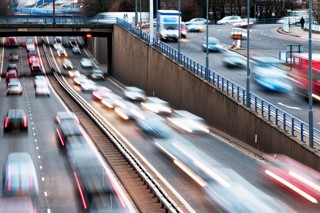City region transport authorities are calling on the Government to give them the power to impose penalties on vehicles to reduce the idling and stop-start conditions that cause congestion and air pollution.
The implementation of Part 6 of the Traffic Management Act 2004 – which includes this measure – is one of five practical policy changes wanted by the Urban Transport Group to help officers tasked with developing and delivering air quality plans.
It has included these in a letter to the Government’s Joint Air Quality Unit – a joint venture between the Department for Transport and the Department for Environment, Food and Rural Affairs to tackle poor air quality.
The letter asks for the following five policy changes:
- Highways England and Network Rail are responsible for significant levels of air pollution in the city regions and they should be required to set out much clearer strategies for meeting their responsibilities in tackling these emissions.
- Part 6 of the Traffic Management Act 2004 should be implemented so that local authorities can enforce moving traffic offences to reduce the idling and stop-start conditions that cause congestion and a build-up of toxic air.
- There should be a long-term plan and consistent funding support for the greening of the bus fleet rather than unpredictable and ad hoc funding pots.
- Provide leadership, and an overarching strategy, for the greening of public service vehicles (such as refuse trucks, ambulances and van fleets) together with targeted financial support.
- Make the NHS part of the solution rather than part of the problem including by requiring the NHS to consult with transport authorities when making decisions on healthcare locations in order to minimise negative impacts on health, the environment and communities.
Jonathan Bray, director of the Urban Transport Group, said: “City region transport authorities are working hard to improve air quality on tight timescales and on tight budgets.
“If we are to hit these targets we need the Government to work more closely with us to crack some of the practical obstacles that stand in our way.
“We believe that by making these relatively straight forward and common sense policy changes, Government can provide vital assistance to those who are working at the sharp end of our efforts to reduce toxic emissions from urban transport as rapidly as possible.
“Our operational asks also complement the higher level strategic asks around funding and fiscal measures which are being pursued at the political level by city region leaders.”
The Urban Transport Group is made up of the UK’s seven largest urban transport authorities – Merseytravel, Nexus, South Yorkshire Passenger Transport Executive, Transport for Greater Manchester, Transport for London, Transport for West Midlands and West Yorkshire Combined Authority.
In May, the leader of Westminster City Council called for instant “four-figure fines” for company vehicle drivers who leave their engines running while parked.
At present, local authorities are unable to impose penalties unless drivers ignore an initial warning and remain stationary for at least another minute.
The fine is £20 or £80 depending on which regulations the authority uses to enforce the law.






















Login to comment
Comments
No comments have been made yet.